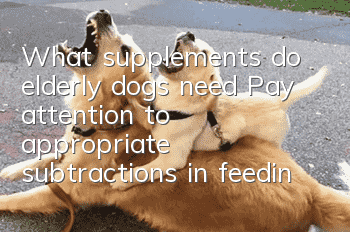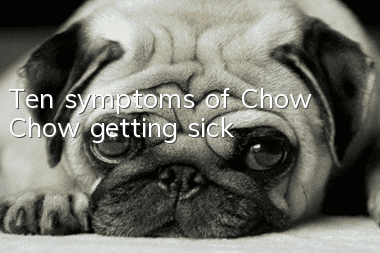What supplements do elderly dogs need? Pay attention to appropriate subtractions in feeding

Old dogs need to supplement unsaturated fatty acids
Unsaturated fatty acids play a role in regulating blood lipids, clearing blood clots, and regulating immunity. You can feed more foods containing unsaturated fatty acids such as salmon.Old dogs need vitamin supplements
Older dogs should moderately increase their intake of vitamins A, B1, B12 and E, which can regulate the metabolism of pets. A lack of vitamins can lead to serious health problems. Taking the right amount of vitamins can keep your body strong and healthy; taking too much can lead to poisoning.Old dogs need to supplement protein
Appropriate intake of protein can supplement the amino acids needed by pets. The amount of activity determines the amount of protein intake. Elderly dogs have relatively less exercise. If they consume too much protein, it will inevitably increase the pet’s metabolic burden. In addition, excessive intake of animal protein will also cause excessive intake of thiamine, which will accelerate the loss of calcium in the bones and lead to osteoporosis. Therefore, try to choose dog food with appropriate protein and no animal by-products based on the dog’s amount of exercise, which can improve the digestion and absorption rate.Old dogs need to reduce their sodium intake
Many elderly dogs suffer from high blood pressure or heart disease. Excessive sodium intake will not only aggravate existing diseases, but also cause serious complications. Difficulty expelling excess sodium from the body. Especially for dogs who have reduced exercise, it is important to control the salt content in food to ensure the health of the dog.Old dogs need to reduce their fat intake
An important cause of obesity in the elderly is fat. As age increases, the metabolic rate of older dogs decreases accordingly, which causes energy consumption to slow down and more heat to be converted into fat to accumulate. Aging dogs only need to eat foods that are lower in fat and energy.Answers to common dietary questions for elderly dogs
1. Whether to change dog food: When the elderly dog maintains normal health, do not worry about the dog’s aging. And replace it with old-age food.
2. Whether to supplement calcium: Older dogs are different from people and do not need special calcium supplements. If you choose an aging formula with lower phosphorus content, you don’t need to supplement calcium specifically, because the ratio of phosphorus and calcium in the dog’s body is reasonable to be healthy, which should generally be 1:1.
3. What to do if you get fat: If your elderly dog has a tendency to get fat, you need to change it to a low-energy dog food, and try to control the weight of the reform, which is a major guarantee for health.
4. What to do if the dog loses weight: If an older dog becomes emaciated and has no other diseases, you can consider giving it puppy food, because puppy food contains more nutrients without losing weight. It will be too much.
- Why do dogs feel like they don’t have enough to eat every day?
- Why does the Irish Red and White Setter have a dry nose?
- What should a female dog feed after giving birth?
- My dog’s period is gone and it’s still swollen down there
- How to train a Border Collie to fly a Frisbee
- My dog's leg fell and he was lame. How long did it take to heal?
- What to do if your dog has diarrhea continuously
- How to know a dog’s IQ? To understand the IQ of dogs, look here!
- Can Teddy be kept in a cage all day long? No! This is very wrong.
- Do dogs need to wear clothes in winter? It depends on the situation!



